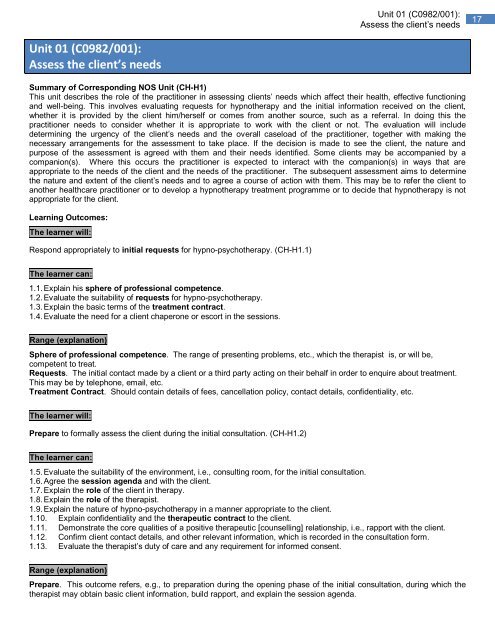Diploma in Cognitive-Behavioural Hypnotherapy - REBHP
Diploma in Cognitive-Behavioural Hypnotherapy - REBHP
Diploma in Cognitive-Behavioural Hypnotherapy - REBHP
You also want an ePaper? Increase the reach of your titles
YUMPU automatically turns print PDFs into web optimized ePapers that Google loves.
Unit 01 (C0982/001):Assess the client‘s needs17Unit 01 (C0982/001):Assess the client’s needsSummary of Correspond<strong>in</strong>g NOS Unit (CH-H1)This unit describes the role of the practitioner <strong>in</strong> assess<strong>in</strong>g clients‘ needs which affect their health, effective function<strong>in</strong>gand well-be<strong>in</strong>g. This <strong>in</strong>volves evaluat<strong>in</strong>g requests for hypnotherapy and the <strong>in</strong>itial <strong>in</strong>formation received on the client,whether it is provided by the client him/herself or comes from another source, such as a referral. In do<strong>in</strong>g this thepractitioner needs to consider whether it is appropriate to work with the client or not. The evaluation will <strong>in</strong>cludedeterm<strong>in</strong><strong>in</strong>g the urgency of the client‘s needs and the overall caseload of the practitioner, together with mak<strong>in</strong>g thenecessary arrangements for the assessment to take place. If the decision is made to see the client, the nature andpurpose of the assessment is agreed with them and their needs identified. Some clients may be accompanied by acompanion(s). Where this occurs the practitioner is expected to <strong>in</strong>teract with the companion(s) <strong>in</strong> ways that areappropriate to the needs of the client and the needs of the practitioner. The subsequent assessment aims to determ<strong>in</strong>ethe nature and extent of the client‘s needs and to agree a course of action with them. This may be to refer the client toanother healthcare practitioner or to develop a hypnotherapy treatment programme or to decide that hypnotherapy is notappropriate for the client.Learn<strong>in</strong>g Outcomes:The learner will:Respond appropriately to <strong>in</strong>itial requests for hypno-psychotherapy. (CH-H1.1)The learner can:1.1. Expla<strong>in</strong> his sphere of professional competence.1.2. Evaluate the suitability of requests for hypno-psychotherapy.1.3. Expla<strong>in</strong> the basic terms of the treatment contract.1.4. Evaluate the need for a client chaperone or escort <strong>in</strong> the sessions.Range (explanation)Sphere of professional competence. The range of present<strong>in</strong>g problems, etc., which the therapist is, or will be,competent to treat.Requests. The <strong>in</strong>itial contact made by a client or a third party act<strong>in</strong>g on their behalf <strong>in</strong> order to enquire about treatment.This may be by telephone, email, etc.Treatment Contract. Should conta<strong>in</strong> details of fees, cancellation policy, contact details, confidentiality, etc.The learner will:Prepare to formally assess the client dur<strong>in</strong>g the <strong>in</strong>itial consultation. (CH-H1.2)The learner can:1.5. Evaluate the suitability of the environment, i.e., consult<strong>in</strong>g room, for the <strong>in</strong>itial consultation.1.6. Agree the session agenda and with the client.1.7. Expla<strong>in</strong> the role of the client <strong>in</strong> therapy.1.8. Expla<strong>in</strong> the role of the therapist.1.9. Expla<strong>in</strong> the nature of hypno-psychotherapy <strong>in</strong> a manner appropriate to the client.1.10. Expla<strong>in</strong> confidentiality and the therapeutic contract to the client.1.11. Demonstrate the core qualities of a positive therapeutic [counsell<strong>in</strong>g] relationship, i.e., rapport with the client.1.12. Confirm client contact details, and other relevant <strong>in</strong>formation, which is recorded <strong>in</strong> the consultation form.1.13. Evaluate the therapist‘s duty of care and any requirement for <strong>in</strong>formed consent.Range (explanation)Prepare. This outcome refers, e.g., to preparation dur<strong>in</strong>g the open<strong>in</strong>g phase of the <strong>in</strong>itial consultation, dur<strong>in</strong>g which thetherapist may obta<strong>in</strong> basic client <strong>in</strong>formation, build rapport, and expla<strong>in</strong> the session agenda.


